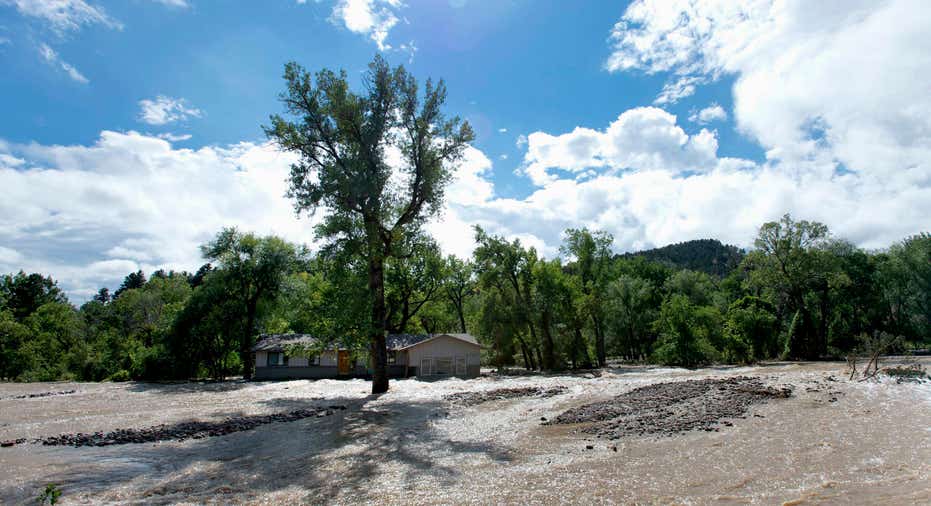Colorado Businesses Volunteering in Flood’s Wake

A week of record-breaking torrential rains and flooding has left eight dead in Colorado, and destroyed more than 1,500 homes in the state.
On top of that, an additional 1,600 homes were damaged, says Micki Trost, public information officer for the Colorado Division of Homeland Security and Emergency Management, and search-and-rescue efforts continue in wake of the mountain-pounding floods.
Remodeling contractor Ty Melton of Melton Design Build says his business in Boulder has already been inundated with calls related to flood damage.
“We had over 140 calls on Friday by noon. We’ve got people working pretty long hours trying to keep up, and we were already pretty busy,” says Melton.
“We’re in a triage area, trying to help out our existing customers and help out some new people,” says Melton, who says six of his 35 employees were affected by the flooding.
Melton says he’s received calls from a number of businesses looking for help putting offices back together, including a law office with a foot-and-half of water on top of documents, and doctors’ offices with standing water as well.
“Some minor things will get taken care of in the next few weeks, some major ones will take months,” says Melton. Some of the homes he’s surveyed are looking at more than a million dollars’ worth of damage.
Businesses Lend a Helping Hand
Melton’s is one of multiple businesses that have reached out to aid the city of Boulder with its recovery efforts. Over the weekend, a Melton Design company truck delivered pallets of water donated from a local Target to responders at the airport.
Boulder Chamber of Commerce president John Tayer says he is touched by the outreach from local businesses looking to help.
“The classic for me was immediately I got a call from Betty Artes of Casa Alvarez, and she started cooking burritos for emergency response folks. She was right on it,” says Tayer.
Artes says she was happy to help out, given that her restaurant experienced only slight flooding in the lower level. While Casa Alvarez and neighboring businesses didn’t see too much physical damage, she says it will still take time to recover.
“We’re impacted by the fact that people were afraid to get out into the streets. Businesses are open, and just resuming normal operations,” says Artes.
In Longmont, one of the cities most heavily affected by the flooding, Public Information Officer Rigo Leal says businesses have also pitched in; he says restaurants including Georgia Boys, Red Robin and Panera donated food in wake of the disaster.
“It’s amazing the amount of food donated,” says Leal. “It’s a great example of the community coming together in that regard.”
Assessing the Damage
Tayer says Boulder’s burgeoning startup scene has made attempts to calculate the total business impact more difficult, as the Chamber of Commerce tries to make contact with local business owners.
“One of the unique things about the Boulder economy is that many are startup entrepreneurs who in many instances don’t work in traditional offices,” says Tayer. So while commercial areas may have experienced lighter flooding, many of the residential areas which experienced serious flooding are home to a number of businesses and startups.
In addition to attempts to fully understand the physical damage experienced by businesses, cities are also trying to figure out the long-term effects of water damage.
In Denver, there are already concerns about the agricultural impact of the flood, despite the fact that the city experienced a lesser amount of flooding than other areas in the state.
“When you have a flood on essentially flat land … it picks up everything from gasoline and diesel fuel to pesticides in agricultural communities, along with large torn-up houses and concrete,” says Tom Clark, the executive vice-president of the Metro Denver Economic Development Corporation.
As the city tries to ascertain the damage to sewage and water treatment plants, Clark says there is worry the soil may be affected for a period of up to three years.
“We’ve had two to three years of good agricultural prices, and for the first time in many years we’ve had our financial head above water. We were forecasting another good year in 2014, and we haven’t begun to revise estimates – it’ll be nowhere near what we’ve had in the last two,” says Clark.
In Boulder, Tayer says the city is also doing everything it can to make sure that food sources haven’t been contaminated, but seems optimistic about the findings.
“Boulder is recognized for having strong protections around hazardous materials, so we expect that we will benefit from that type of approach,” says Tayer.



















